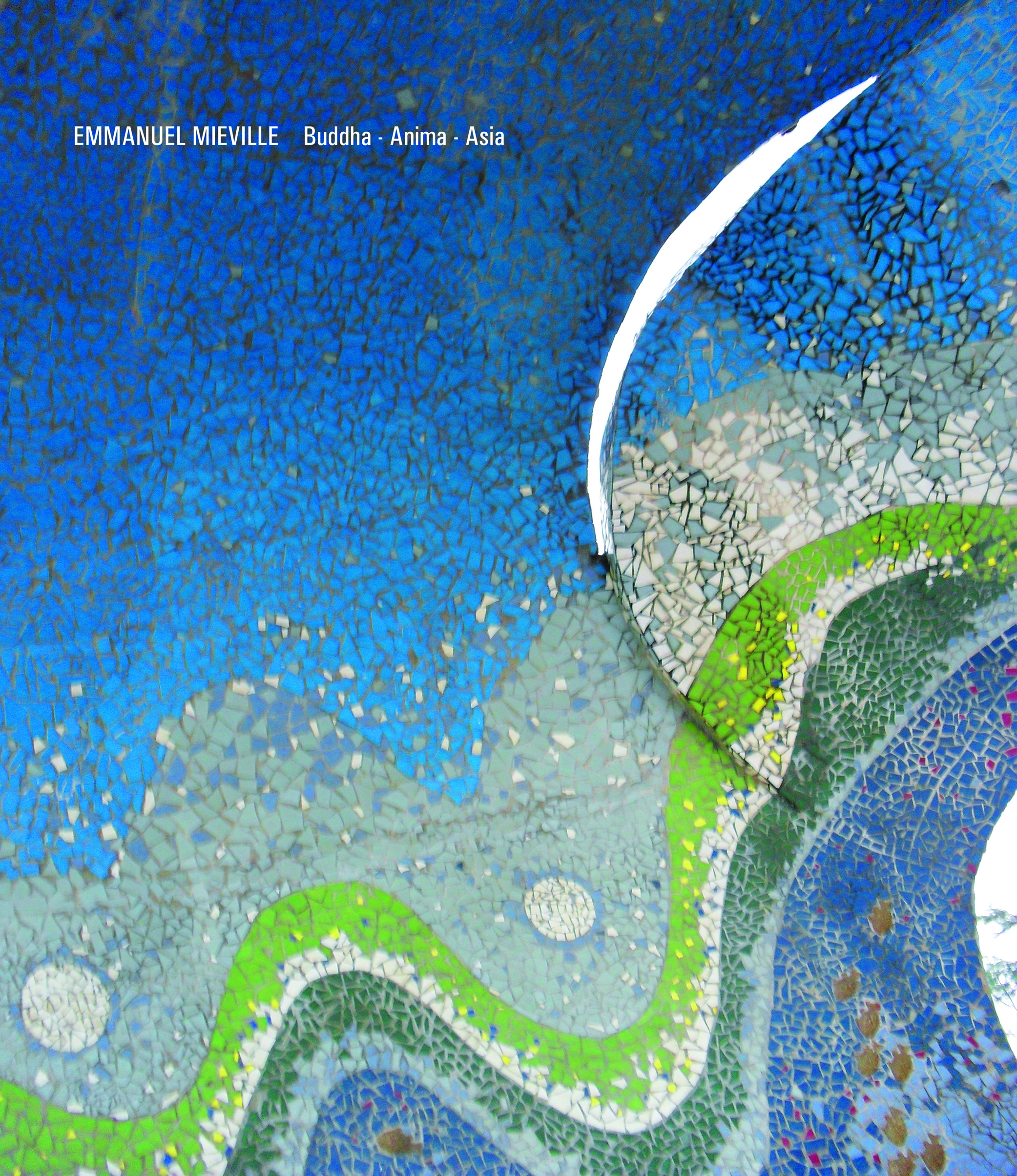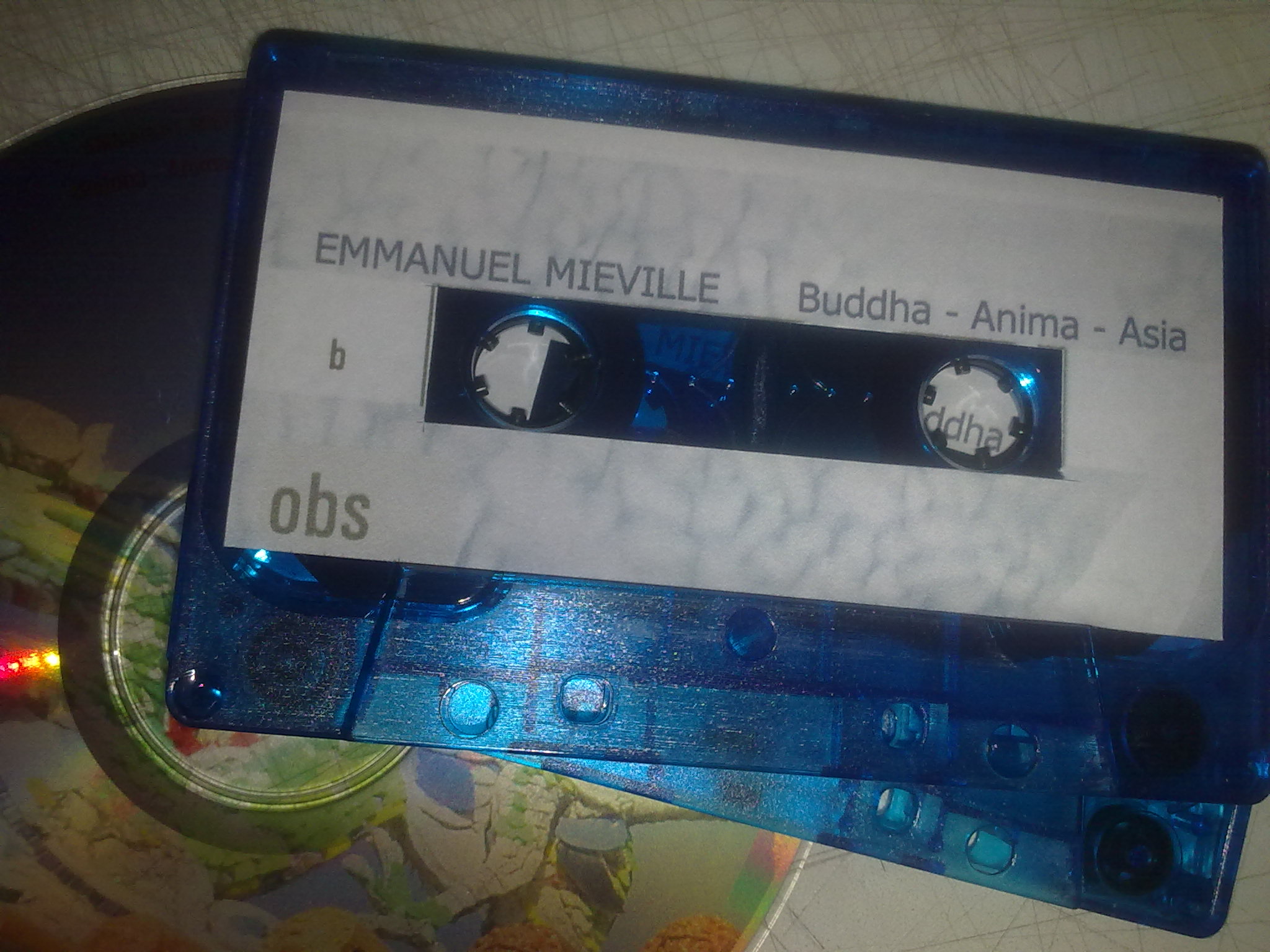
obs * tradition|037 cd/cassette, solo, 64 min
lim to 300 num copies, folder+booklet
EMMANUEL MIEVILLE
Buddha - Anima - Asia
cd: 14eur worldwide incl shipping
compact cassette (fe type): 10eur worldwide incl shipping
compact cassette (chrome type): 12eur worldwide incl shipping
paypal: abser1@yandex.ru
Obs* présente le nouvel opus solo d’Emmanuel Mieville, l’album Buddha-Anima-Asia, qui nous plonge avec force dans les traditions et rituels bouddhistes asiatiques.
Field recordings de Taiwan, de Malaisie et du Népal constituent la base de son travail de composition.
La première pièce est basée sur des enregistrements de nonnes au monastère de Copan au Népal.La deuxième est basée sur des prières hindoues enregistrées au temple Batucave de Kuala Lumpur,Malaisie.La troisième est composée a partir de l’enregistrement d’une cérémonie Taoiste dédiée a la déesse japonaise Matsu, au temple Peikang a Taiwan.
La dernière pièce est composée a partir de prières funéraires pour la mémoire d’un jeune défunt.
Quatre longues compositions qui combinent ce style très maitrisé d’electro-field recording, avec divers degrés de traitements electroacoustiques.Des effets de surprise et la clarté de présence des actions sacrés sont quelquefois détachées grâce au textures electro, du processus d’analyse et de pensée musicales . Un travail excellent et absolument immersif !
Emmanuel Mieville est né à Paris a fait des études musicales au GRM avec Philippe Mion et Jacques Lejeune, ainsi que des études d'ingénieur du son a l’école Louis Lumière qui ont influencé son penchant vers la matière sonore et ses évolutions malléables.L'écoute d'émissions documentaires de créations à la radio l’entraine vers la musique concrète, la liberté musicale et l'apprentissage partout dans le monde à l'usage de ses oreilles, par exemple lors de voyages en Chine,au CostaRica, en Malaisie, au Japon.Après diverses expériences comme technicien intermittent(prise de son en concert, radio, restauration d’archives sonores), il s’engage fortement dans la composition, enrichie notamment grâce à l’écoute et à la production d’émissions documentaires créatives pour France-Culture, ou il deviendra producteur d’émissions comme l’Atelier de Création Radiophonique.Il a joué du gamelan javananais pendant deux ans.
Ses recherches sur la perception sonore sont objectivées par la pratique du field recording, où la decontextualisation du lieu, dépassant la dialectique entre paysage sonore et mémoire, infructueuse pour l’auditeur, produit une perception et une conscience renouvellée de l’environement sonore quotidien.
Ses œuvres acousmatiques sont régulièrement programmées dans le festival Licences/Brûlure des langues par A.Yterce.Une de ses pièces radiophonique a été diffusée dans deux festivals en Espagne : Zeppelin-festival de Arte Sonoro(Barcelone) et Confluencias(Séville).Il a collaboré à des créations pour la danse, avec Sumako Koseki, Cinzia Menga danseuses Buto, et pour la video avec Heesok Yu. Ses collaborations incluent aussi des concerts avec Benjamin Thigpen, Das Synthetich Mischgewebe.Les labels qui ont édité sa musique sont XingWu(concert/installation vernaculaire avec Eric Cordier), Tibprod(split cd avec Tore H.Böe),Son@rt(poésie sonore et musique concrète), And/oar(field recordings), Taälem(drone music).Lona records, Baskaru(tropical field recordings) et Obs*.
Introducing the new solo work of Emmanuel Mieville. the album Buddha-Anima - Asia plunges us into the impact of Asian Buddhist Traditions. Four field recordings made in Malaysia, Taiwan and Nepal. The first track is Buddhist chanting by nuns recorded in Copan, Nepal.
The second track is sounds from Hindu Ceremony recorded in Kuala Lampur, Malaysia.The third and fourth tracks are composed with sounds from Taiwan, track 3 is from Taoist ceremony dedicated to the japanese godess Matsu.Track 4 is funeral sond for a young man deceased.
Four long songs perfectly combine this mastery of style and electro field recordings with varying degrees of processing.
Very bright and surprising effect of full presence in the development of sacred actions, sometimes electro-wave helping to complete detachment from the thought process and analysis of the sound track ... Absolutely excellent 'immersing' work!
Emmanuel Mieville is Paris born composer who studied in a cinema school in the sound engineer section, and learned musique concrète at the GRM.His approach to experimental music and soundscape composition was fueled by constant listening of creative radio programs since his childhood.He realised many radio shows for french national broadcasting(France-culture and France- Musiques), for example music for shakuhachi, voice and electronics.The last few years as guest composer for Framework’s field recordings based shows, on Resonance fm.
He palyed non european instruments such as Javanese gamelan for two years.
His concern for aural perception, and memories engraved in urban and wildlife environements, yields compositions where soundfield materials are layered, mixed and sometimes transformed by effects.The portrayal of a specific location,with its blurred and erratic emotions conveyed to the ears,is what he aims, interpreting and composing the concrete substance to pass it in return to the listener.
He has collaborations with dancers, photographers,video artists and improvises with fellow musicians, such as Eric Cordier, Guido Huebner, Benjamin Thigpen, Heesok Yu, among others.His electroacoustic pieces have been played in festivals by Motus and Licences-Brulures des langues, in Spain (Confluencias), Italy (finalist of the Udine composition competiton).He performed concerts, and improvised with musicians in Malaysia, HongKong, CostaRica, Taiwan, Paris.He is also interpret of other’s music, among which K.H Stockhausen, with the CLSI, a innovative laptop group. He has released music on labels such as Tibprod (with Töre H.Boe), XingWu, Lona records, Baskaru.
25.5.2012
fragment Track_04.mp3
Nyorai (soundcloud)
Emmanuel Mieville’s field recordings are some of the purest, most thought-provoking around. Rarely manipulated and often left to drift out to their natural conclusions, his sonic snippets of Asian life – most strikingly presented on last year’s Four Wanderings In Tropical Lands – collide city with country, ancient religion with modern consumerism and the innocence of nature with crushing man-made metals.
The questions raised by Mieville are deep and often uncomfortable. For his new CD on the Russian Obs label (previously Observatory Records and then Observatoire), he visited funerals (I take the album’s dedications to be to the deceased) and various other Hindu and Buddhist ceremonies to create an album that begins in a burst of noise and settles slowly into ticking, screeching and ever-changing series of sounds in which the unpredictability of nature is pitted against the clockwork and often unpleasant rhythms of our own making.
What the Buddha would think of ‘Nyorai’ is anyone’s guess. The track’s title – a Japanese translation of the Sanskrit ‘Tathāgata’ that signifies the highest level of Buddhist enlightenment and transcendence – would suggest peace, but the opening ten minutes are given over to ear piercing blasts of noise, scraps of metal and squeaking wooden contraptions. The chanting comes right at the end and lasts only a few seconds – the path to enlightenment is evidently a long and painful process. ‘Batucave’ is a more typical Mieville recording, with heavy rain dropping as cockerels crow, insects crackle and prayer can be heard in the distance. Batu Caves is a Malaysian cave system-cum-shrine network where a great golden deity towers over visitors, monkeys roam free and Hindu festivals take place. Mieville presents it fairly straight – the rain falls in great streams from the caves’ stalactites, the sound of opportunistic locals hawking their cheap religious tat to tourists echoes in the air and the odd genuine chant of prayer goes up.
Mieville continues to ask serious questions about religion. During Four Wanderings the playful laughter of children was abruptly brought to an end by the necessity to attend evening prayer, and here he surrounds it either with unbearable noise or the wails of commerce. On ‘Peikang Matsu’, recorded in a Taiwanese temple, it sounds as though serious renovation work is taking place. The grind of electronic equipment is so loud to begin with as to drown everything else out. There is no sign of other life – worship would be impossible with this going on – so one imagines the temple clogging with stone dust. Some heaven, this. Visitors do eventually enter – loudly, through what sounds like turnstiles – and when you emerge onto the street into the sound of traffic the effect is positively cleansing.
Finally ‘Taisi Funeral’, recorded in a resolutely old-fashioned Taiwanese township. The gleaming opening gives way to chants and the repetitive clack of hollow wooden blocks being struck. For once you sense Mieville is standing back respectfully. His main contribution is the introduction of a series of bright, airy tones that hover above the funeral proceedings like wisps of aether preparing to receive the soul of the deceased. There is no obvious cynicism present and it ends the album on an intriguingly ambiguous note. It’s as though, presented with religion’s true worth – the hope, the comfort in belief – Mieville has been forced to acknowledge what it brings to the people of a region relatively untouched by the heaving belly and gnashing jaws of consumerism. His beef here isn’t with religion per se; more with the corporate, money-grabbing opportunism that sullies its purity on a mass scale.
Steve Dewhurst, Foxy Digitalis






